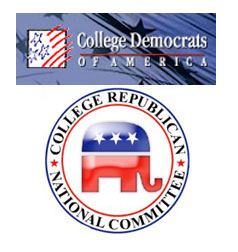
Political Engagement Increases Among Emory Students
Mirroring national trends among college-age youth, a survey
conducted this semester by Emory University political science
professor Alan Abramowitz indicates that Emory students
are much more politically engaged this year than they were
two years ago.
The survey, which was conducted in early October in Abramowitz's
introductory American politics class and his upper division
American elections class, found that 66 percent of Emory
students described themselves as very interested in politics
or as "political junkies" this year compared
with only 52 percent in 2002.
Even more striking was the fact that 95 percent of the
students claimed to be registered to vote this year compared
with only 68 percent two years ago, just before the 2002
midterm election.
To read more about Abramowitz's student survey,
click here.
.
For Journalists:
|
|
 |
Social
Security Proposal Combines Rewards and Risks
Emory economist Robert Chirinko says there are both rewards and risks in President
Bush's proposal to use personal accounts funded from Social Security taxes to
provide part of government retirement benefits.
Feb. 3, 2005
|
Emotions,
Not Facts, Form Basis of Political Opinion
An Emory study has found that when it comes to forming opinions and making judgments
on hot political issues, most people don't let facts get in the way of their
decision-making. The research, led by psychology professor Drew Westen, tested
whether people make decisions based on emotional bias or fact, and emotions won
by a landslide.
Jan. 25, 2005 |
Emory
Study Says Incumbents Hard to Beat
Competition in U.S. House elections has declined for more than 50 years, and
those in 2004 were the least competitive of the postwar era, says Emory political
scientist Alan Abramowitz.
Jan. 6, 2005
|
Since
1988, Presidential Election Forecast Model Picks Popular Vote Winner
Despite mediocre approval ratings and below average economic growth, President
George W. Bush won a second term in the White House as correctly predicted in
July by the "time-for-change" forecasting model developed by political
scientist Alan Abramowitz. The model has correctly predicted the popular vote
winner in every presidential election since 1988.
Dec. 3, 2004 |
Analysis
Shows Bush Made Largest Gains Among Less Religious
Emory political scientist Alan Abramowitz says that President Bush made gains
across the board among voters, regardless of their degree of religious commitment,
but that he made his largest gains among less religious voters.
Nov. 9, 2004 |
Gay
Marriage Referenda Did Not Affect Voter Turnout
An analysis by Emory political scientist Alan Abramowitz
of voter turnout in each state during the presidential election indicates
that the presence of gay marriage referenda on the ballot had no impact
on turnout levels.
Nov. 9, 2004
|
After
the Election: Emory Experts Can Discuss Moving On
The 2004 presidential election has been one of the
most heated in decades. The electorate has never been so divided
with a nearly 50-50 split, so half of voters will be disappointed
with the outcome of the election. Emory faculty members are available
to discuss various aspects of life in the United States after the
election.
Nov. 2, 2004 |
Elections
Experts
The following Emory faculty, all veteran campaign watchers,
are available to discuss aspects of the 2004 presidential campaign,
from the primaries to what's on voters' minds. |
|
Merle
Black Notes Historic Election Feature
Assuming President Bush is re-elected, the truly historic feature of the 2004
elections is that "this will be the first time since the late 1920s that
Republicans have held the White House and both houses of Congress in two consecutive
elections," says Merle Black. "You have to go back to the days of Herbert
Hoover to see a similar result." Black is an expert on national politics
and political parties. He, along with his twin brother Earl, is the foremost
authority on politics in the South, particularly the rise of the Republican Party.
He can be reached at 404-727-6570 or merle.black@emory.edu.
Nov. 3, 2004
|
| Education
Levels and Ideology May Help Drive Partisanship
The staunch party loyalty of American voters is driven more by ideology than
the social identities that drove the preferences of previous generations, according
to research by Emory political scientist Alan Abramowitz. The result has been
a realignment of party loyalty in the United States in recent decades that is
helping to drive partisanship in national politics, he says.
Sept. 1, 2004
|
| Course
Explores Politics as Theater
As Republicans and Democrats go full throttle
against each other to win the hearts of American voters,
Emory students in the course "Why all the Controversy?
Rhetoric, Culture and the 2004 Election" are paying
close attention to the drama, and analyzing the "scripts" each
party follows to get across its messages.
Aug. 31, 2004
|
U.S.-European
Relations Unlikely to Improve, Says Emory Expert
U.S.-European relations are unlikely to
improve in the near future, says Christian Tuschhoff, an
expert on international politics at Emory. What divides
America from its European allies is a fundamental difference
in the way foreign policy is approached.
Aug. 24, 2004 |
Stem
Cell Research Hampered by Limits to Existing Cell Lines
As debate about federal limits on stem cell
research nears with the Democratic National Convention, Emory
scientists feel there is a critical need for new stem cell
lines for research in developing treatments for debilitating
diseases, such as Alzheimer's, that have proven elusive to
medical scientists.
July 20, 2004 |
Presidential
Polling Offers Limited Perspective
Trying to precisely
predict the outcome of last year's presidential election based on the
available crop of polls is the equivalent of reading tea leaves--and
about as accurate, according to Patrick Noonan, an expert on polling
and decision analysis at Emory University's Goizueta Business School.
July 1, 2004 |
Young
Voters Have a Duty to Get to the Polls, Opines Emory Student
In a "New Attitudes" column for The Atlanta
Journal-Constitution, Emory senior William Corbin writes that young
people need to reverse the trend of "abysmal" voter turnout
in their age group. He says that the number of young people who turn
out to vote is most important for an election, not necessarily the
number who register to vote this election year. To read more of his
column, click here.
June 9, 2004 |
Young
Republican Women Take Active Role in Politics
To be young, Republican and a woman is an anomaly on
many college campuses where most peers lean a little to the left. Although
they are in the minority both on campus and nation-wide, female members
of Emory's College Republicans say that they have found in the Republican
Party a home that reflects their political values: smaller government,
strong families, fiscal responsibility, individual empowerment and
conservatism on divisive social issues.
May 20, 2004 |
Political
Forecasting Looks at Minds of Voters
Instead
of relying on factors such as history, polling and approval ratings to forecast
voter behavior, Emory psychologist Drew Westen developed a political forecasting
model that looks at the role of emotions in how people make decisions about
political issues and candidates.
March 26, 2004 |
|
|
|
|
|
| |
| |
| |
|
